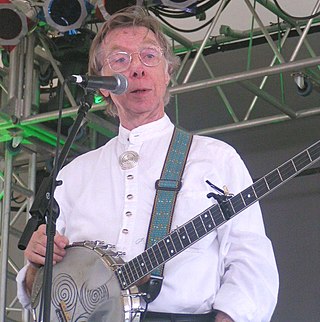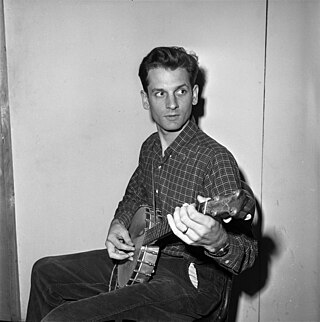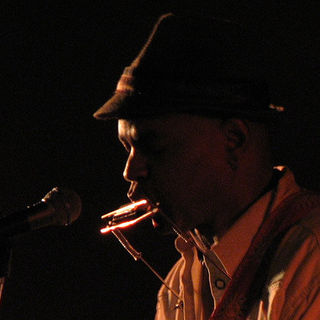Related Research Articles

The Rock and Roll Hall of Fame (RRHOF), sometimes simply referred to as the Rock Hall, is a museum and hall of fame located in downtown Cleveland, Ohio, United States, on the shore of Lake Erie. The museum documents the history of rock music and the artists, producers, engineers, and other notable figures and personnel who have influenced its development.
The story of Tennessee's contribution to American music is essentially the story of three cities: Nashville, Memphis, and Bristol. While Nashville is most famous for its status as the long-time capital of country music, Bristol is recognized as the "Birthplace of Country Music". Memphis musicians have had an enormous influence on blues, early rock and roll, R&B, and soul music, as well as an increasing presence in rap.

Old-time music is a genre of North American folk music. It developed along with various North American folk dances, such as square dancing, clogging, and buck dancing. It is played on acoustic instruments, generally centering on a combination of fiddle and plucked string instruments, most often the banjo, guitar, and mandolin. Together, they form an ensemble called the string band, which has historically been the most common configuration to play old-time music. The genre is considered a precursor to modern country music.

Thomas Makem was an Irish folk musician, artist, poet and storyteller. He was best known as a member of the Clancy Brothers and Tommy Makem. He played the long-necked 5-string banjo, tin whistle, low whistle, guitar, bodhrán and bagpipes, and sang in a distinctive baritone. He was sometimes known as "The Bard of Armagh" and "The Godfather of Irish Music".

Mike Seeger was an American folk musician and folklorist. He was a distinctive singer and an accomplished musician who played autoharp, banjo, fiddle, dulcimer, guitar, mouth harp, mandolin, dobro, jaw harp, and pan pipes. Seeger, a half-brother of Pete Seeger, produced more than 30 documentary recordings, and performed in more than 40 other recordings. He desired to make known the caretakers of culture that inspired and taught him.

A one-man band is a musician who plays a number of instruments simultaneously using their hands, feet, limbs, and various mechanical or electronic contraptions. One-man bands also often sing while they perform.

Delano Floyd McCoury is an American bluegrass musician. As leader of the Del McCoury Band, he plays guitar and sings lead vocals along with his two sons, Ronnie McCoury and Rob McCoury, who play mandolin and banjo respectively. In June 2010, he received a National Heritage Fellowship lifetime achievement award from the National Endowment for the Arts and in 2011 he was elected into the International Bluegrass Music Hall of Fame.

"Low Bridge, Everybody Down" is a folk song credited to Thomas S. Allen, first recorded in 1912, and published by F.B. Haviland Publishing Company in 1913. It was written after the construction of the New York State Barge Canal, which would replace the Erie Canal, was well underway, furthering the change from mule power to engine power, raising the speed of traffic. Also known as "Fifteen Years on the Erie Canal", "Fifteen Miles on the Erie Canal", "Erie Canal Song", "Erie Barge Canal", and "Mule Named Sal", the song memorializes the years from 1825 to 1880 when the mule barges made boomtowns out of Utica, Rome, Syracuse, Rochester, and Buffalo, and transformed New York into the Empire State.

Gordon L. Goodwin is an American pianist, saxophonist, composer, arranger, and conductor. He is the leader of Gordon Goodwin's Big Phat Band. He has won four Grammy Awards and three Daytime Emmy Awards, and has received over twenty Grammy nominations for his compositions and arrangements.

Guy Davis is an American blues guitarist, banjo player, and two-time Grammy Award nominee. He is the second child and the only son of the actors Ruby Dee and Ossie Davis.
Ethel is a New York based string quartet that was co-founded in 1998 by Ralph Farris, viola; Dorothy Lawson, cello; Todd Reynolds, violin; and Mary Rowell, violin. Unlike most string quartets, Ethel plays with amplification and integrates improvisation into its performances. The group's current membership includes violinists Kip Jones and Corin Lee.

Peter Ostroushko was an American violinist and mandolinist. He performed regularly on the radio program A Prairie Home Companion and with a variety of bands and orchestras in Minneapolis–Saint Paul and nationally. He won a regional Emmy Award for the soundtrack he composed for the documentary series Minnesota: A History of the Land (2005).
Donald David Guard was an American folk singer, songwriter, arranger and recording artist. Along with Nick Reynolds and Bob Shane, he was one of the founding members of The Kingston Trio.

Phillip Jackson, best known as Norton Buffalo, was an American singer-songwriter, country and blues harmonica player, record producer, bandleader and recording artist who was a versatile proponent of the harmonica, including chromatic and diatonic.
The McGee Brothers were an American old-time performing duo of brothers Sam McGee and Kirk McGee. Sam typically played guitar and Kirk usually played banjo or fiddle, although they were both proficient in multiple string instruments. The McGee Brothers were one of the most enduring acts on the Grand Ole Opry during the show's first fifty years. They made their initial appearance on the Opry in 1926 and the following year joined Uncle Dave Macon's band, the Fruit Jar Drinkers. In the 1930s, the McGees teamed up with early Opry fiddler Arthur Smith to form a string band known as the "Dixieliners," and in the 1940s they played and toured with Bill Monroe and His Bluegrass Boys and several other notable acts.
This article brings together lists of artists, locations, artistic productions and movements associated with upstate New York.
The Concord String Quartet was an American string quartet established in 1971. The members of the quartet were Mark Sokol and Andrew Jennings, violins; John Kochánowski, viola; Norman Fischer, cello. They gave their last regular concert on May 15, 1987. An anniversary concert was given in December 1996 at the Naumburg Foundation.

The United States Military Academy Band, West Point, New York is the first CD, digital format album released exclusively by The United States Military Academy Concert Band and Jazz Knights big band.
Gary Griffin is an American musician, best known for performing as a keyboardist and vocalist with The Beach Boys, Brian Wilson, Jan and Dean and The Surf City Allstars.
In Performance at the White House is a PBS television series of performances from the White House, the residence of the president of the United States. The series began in 1978.
References
- ↑ "About Dave".
- ↑ Budnick, Dean (1998). "Jam Bands": North America's Hottest Live Groups, Plus How to Tape and Trade Their Shows. ECW Press. ISBN 1-55022-353-4.
- ↑ "Musician/educator Dave Ruch remembers Ermina Pincombe". northcountrypublicradio.org. 20 August 2014.
- ↑ "Dave Ruch". nyhumanities.org. Archived from the original on 2017-01-08. Retrieved 2016-11-09.
- ↑ "TAUNY - News".
- ↑ "Mountain Lake PBS Adirondack Music Documentary Honored with an Emmy!". mountainlake.org. Archived from the original on 2015-07-15. Retrieved 2015-03-16.
- ↑ "All hail the Erie Canal". CBS News . 9 July 2017.
- ↑ "2011-15 TOURING ARTISTS". New York State Presenters Network. Archived from the original on 2015-07-16. Retrieved 2015-07-16.